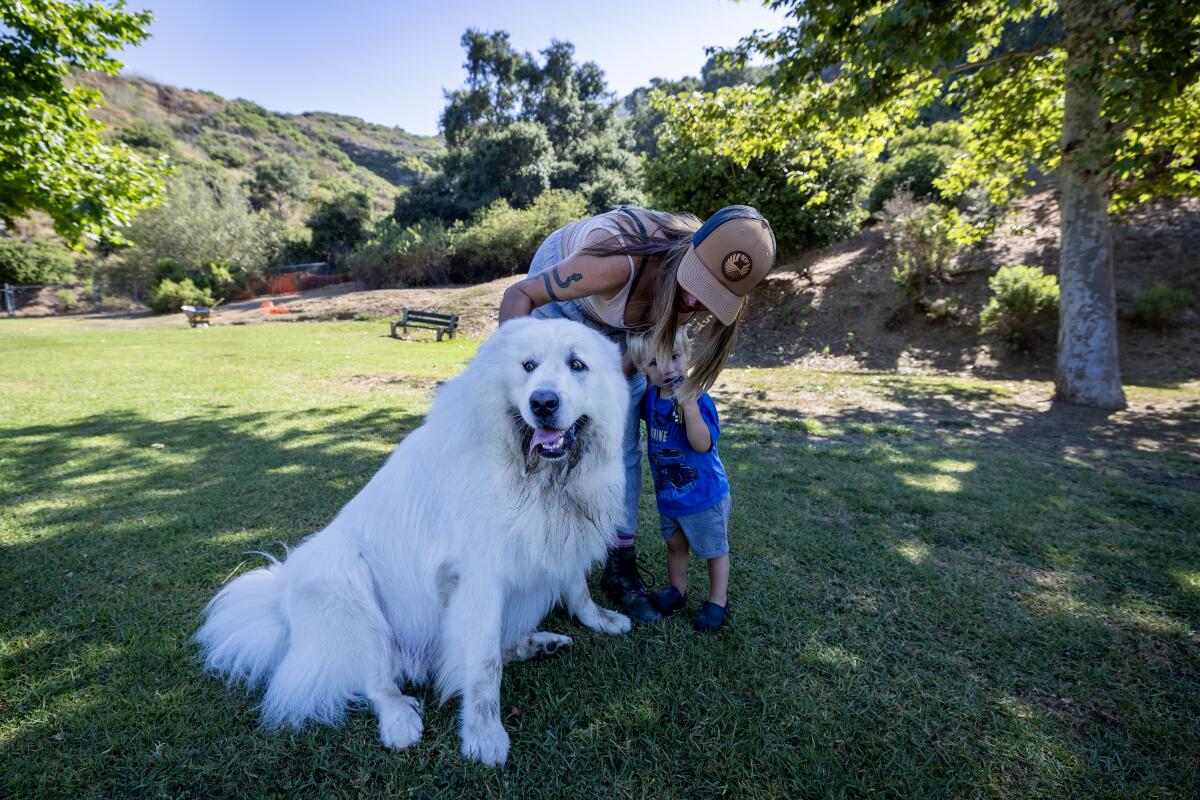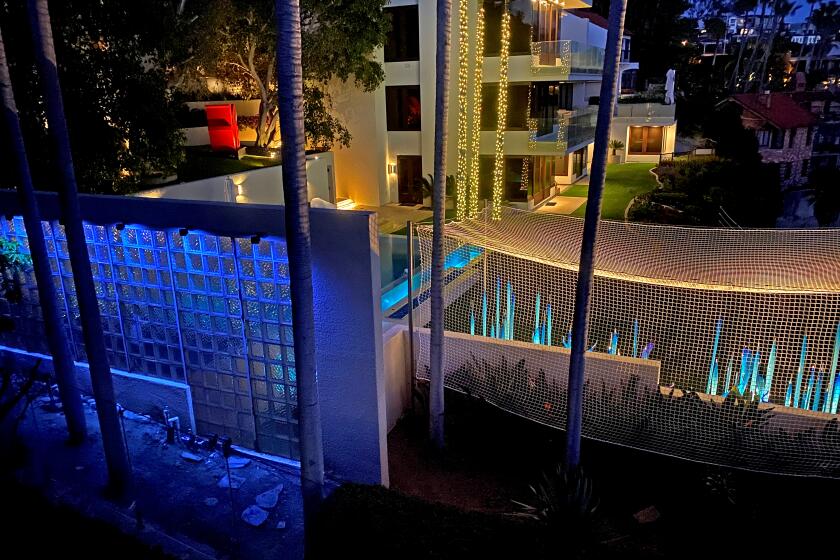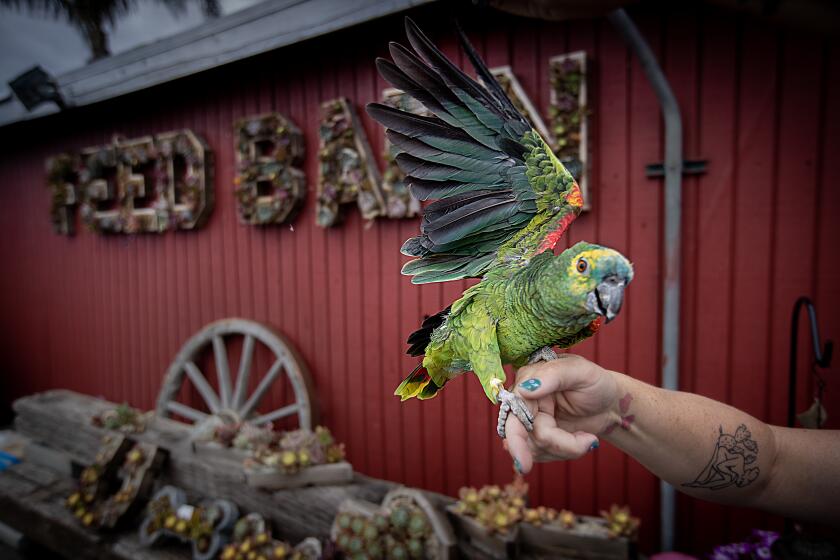How long can a dog bark before you can file a complaint? Laguna Beach counts the minutes

- Share via
Michael Obrand purchased his home in south Laguna Beach in the late 1990s, drawn by the serenity of a hillside neighborhood with ocean views. But he’s found over the years that even this patch of paradise isn’t immune to the vexing irritations of suburban life.
In recent years, it’s been the neighborhood dogs.
“I mean I wouldn’t even call it barking,” he said of the ruckus one neighbor’s dogs used to make when left to their devices outside. “It was more like screeching.”
Obrand, 78, said he was jolted awake by loud barking as early as 5 a.m. by the neighbor’s dogs. And he would return home in the evening from his work as an attorney only to hear the raucous vocalizing continue on the back patio. Attempts to reason with that neighbor proved fruitless, he said, so he asked the city to step in.
Laguna Beach responds to hundreds of complaints each year about dogs unnerving residents with loud or persistent barking and yowling. For years, dog owners have fired back after receiving warnings or citations, criticizing the city’s regulations on nuisance barking as ill-defined and unfairly applied. In August, the Laguna Beach City Council unanimously voted to amend the ordinance on dog barking to lay out specifics of when a canine’s vocalizations will be considered an actual noise violation.
Under the amended ordinance, which takes effect this month, a resident can report a dog to the city only if it barks nonstop for 30 minutes or intermittently for 60 minutes over a 24-hour period. Jim Beres, a Laguna Beach Police Department administrator who oversees animal control, said at a recent City Council meeting that the change is going to make it “much more difficult to prove a code violation.”
Officials have not yet outlined the specific evidence or documentation residents will need to prove a dog’s barking has risen to the level of a violation.
Laguna Beach has a history of cracking down on sounds common to residential beach life in Orange County: the roar of motorcycles and luxury sports cars speeding down Coast Highway; the mechanical clanging of trucks and tools as multimillion-dollar homes are built or refurbished; and rowdy bar and restaurant patrons making merry in the city’s downtown.
In 1993, the city banned both gas-powered and electric leaf blowers after enough residents complained about the daily roar emanating from the city’s meticulously groomed yards. During a 2021 City Council meeting, one resident likened noise pollution to “sewage.”
The hush of tranquility is so important to some locals that disruptive sounds and sights have been at the center of high-profile neighbor disputes.
The battle between the billionaire bond king and his neighbors started over lawn decor and devolved into psychological warfare. It ended in mutual defeat.
In a legal battle concluded last year, Mark Towfiq, a wealthy tech entrepreneur, accused his neighbor, billionaire Pimco founder Bill Gross, of blasting the theme song to “Gilligan’s Island” at all hours to punish him for complaining to the city about a blue glass sculpture Gross had installed in his backyard. Gross had wrapped the sculpture — a 22-foot-long creation by blown-glass artist Dale Chihuly — with a 12-foot-high netting structure to protect it from the elements. Towfiq and his wife complained the netting was ugly and obscured the view from their seaside mansion.
An Orange County Superior Court judge found that Gross had indeed put the “Gilligan’s Island” song on a play loop to harass his neighbor and ordered Gross not to violate the noise provisions of the Laguna Beach municipal code or play music on his outdoor speakers when not in the yard or pool area of his estate.
Gross ultimately was allowed to keep the sculpture, but took down the netting and agreed not to illuminate the artwork later than 10 p.m.
More recently, it’s been the dogs that have neighbors hounding one another.
“I think in Laguna there’s just a desire to complain,” said Tawna Bliss, who lived in the city for years before moving to Laguna Hills in 2021.
Bliss has been on the receiving end of dog-barking complaints. She said she had a neighbor who would text her after the first few barks: “Can you shut your dog up?”
“His dog would yap all day long, but I never said anything,” Bliss said, as she watched her toddler, Emerson, snuggle into the fluffy white coat of the family’s Great Pyrenees mountain dog, Lucian, at a dog park on Laguna Canyon Road. “Dogs are going to bark.”

So far this year, Laguna Beach — a city of 22,000 — has received 73 complaints about barking and issued 23 warnings. Last year, the city logged 213 complaints and handed out 76 warnings and five citations. In 2021, it received 222 complaints and issued 81 warnings and nine citations.
By comparison, Irvine — with more than 300,000 residents — has logged 456 complaints about barking this year and issued 14 warnings.
Cities across Orange County, including Irvine, Huntington Beach and San Clemente, have rules on their books to define just how much barking is considered a disruption. But for years, Laguna Beach operated without any specific parameters. Rather than a defined number of minutes of barking, animal control approached enforcement based on the number of complaints received about an animal, the circumstances and what the officer felt was reasonable.
This has led to a situation where “some dog owners feel they have been treated differently than others,” Beres said. “And, in all candor, that has been true to some degree.”
Southern California is seeing a rash of parrot thefts. The pricey feathered companions have been stolen from pet stores, porches, even a vet.
Typically, officers respond to complaints by issuing a warning to the dog owner and providing tips about how to limit barking. If an officer decides the situation warrants a fine, the cost is $100 for a first offense, $200 for a second offense and $500 for third and subsequent offenses within a 12-month period, according to the city’s municipal code.
In some cases, dog owners complained that a neighbor’s call to animal control to report excessive barking was really just a form of payback for other friction between neighbors.
Laguna Beach City Councilman Alex Rounaghi said the change was necessary to create an objective definition that can be applied evenly.
“Residents have complained about nightmare scenarios of neighboring dogs barking all night,” he said. “I hope that neighbors can resolve these issues among themselves. But if the city gets involved in enforcement, its critical that due process is protected.”
Still, Obrand worries the changes to the law will make it difficult for residents to even reach out to the city for help in mitigating problem barking. In his case, he said, the city’s intervention made a difference. Now, he fears, residents will simply have to put up with the nuisance or risk creating bad blood with their neighbors.
Under the new standards, Obrand said, his neighbor’s dog-barking issues would not have been considered a violation “even though it was really a substantial disturbance.”

On a recent weekday, Marissa Dahlberg, 34, watched as her two daughters played with their rescue dog Tallulah at the Laguna Canyon Road dog park. Dogs yipped playfully as they chased each other around the green expanse.
Dahlberg knows that Tallulah, a 9-month-old mixed breed, barks when her family leaves the house. She opts to put her pup in a doggy daycare when her family is planning an all-day outing. But if she runs out for a quick errand, she’ll let her neighbors know that Tallulah will probably bark, but that she’ll be back soon. Building a good rapport with her neighbors “has gone a long way,” she said.
She suspects the changes in the ordinance might force others to do the same — and that could be a good thing.
“Just talking to your neighbors is the way to go,” she said.
More to Read
Sign up for Essential California
The most important California stories and recommendations in your inbox every morning.
You may occasionally receive promotional content from the Los Angeles Times.
















